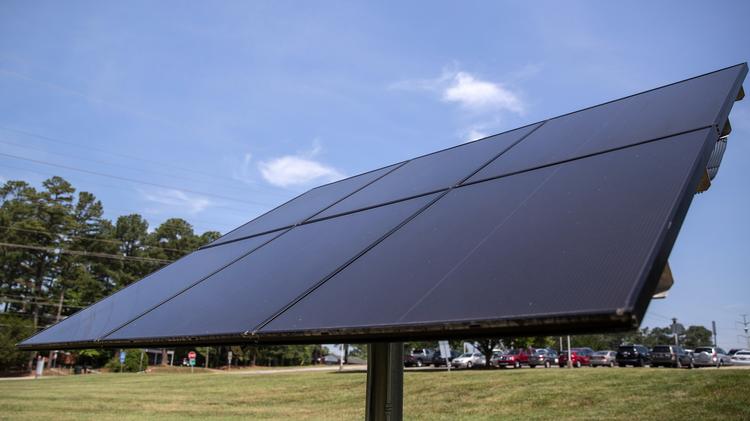Shunned by big utility, N.C. solar installers turn to religious leaders for support
JOHN WEST
Solar Panels on the campus of N.C. State University.
Jeff Jeffrey, Staff Writer, Triangle Business Journal
After failing to get support from the North Carolina’s largest public utility, a group of residential solar installers has appealed to a higher power in their effort to convince state lawmakers to extend the 35 percent renewable energy tax credit that is set to expire at the end of the year.
The solar installers have teamed with representatives of the religious community to continue making their case that without the tax credit, the companies will lose out on hundreds of installation jobs – and millions of dollars in revenue. They are calling on the General Assembly to pass a two-year extension to the tax credit that steps it down over time.
On the solar industry side, the new coalition includes top executives from Baker Renewable Energy, Southern Energy Management, Sundance Power Systems and Yes! Solar Solutions. They are joined by religious leaders from Kehillah Synagogue and the United Church of Chapel Hill and from the N.C. Interfaith Power and Light, a nonprofit organization that works on behalf of religious groups on climate change issues.
Susannah Tuttle, executive director of N.C. Interfaith Power and Light, says her group decided to join with the solar installers because it wants to show lawmakers what the renewable energy tax credit means to an often overlooked customer base with access to large roofs that are perfect for solar panels.
“The tax credit is a huge reason that so many houses of worship have been able to install solar panels on their roofs,” Tuttle says. “It’s taken years for many of them to get to the point where they are ready to move forward with installation. But if the tax credits are not continued, those projects will just stop.”
Tuttle says it is often more difficult for religious organizations to get the money together for a large solar installation project because of their nonprofit status. For tax reasons, many congregations have had to form L.L.C.s to pool donations, a process that often takes years to complete, or go after a single donor who is willing to fund the project. “Without the tax credit, the inventive to donate goes away,” Tuttle says. “But these projects are important because the money saved on energy costs can be put back into the faith organization’s mission to serve the community.”
Rabbi Jen Feldman of Kehillah Synagogue says her congregation raised $106,000 to install solar panels on the synagogue’s roof. The project took several years to come together. Once complete, it is expected to reduce the synagogue’s energy costs by 75 percent. She credits the renewable energy tax credit with helping to secure donations.
“We came at this from a place of faith,” Feldman says. “Climate change is such a huge, intractable problem that you can be stunned into doing nothing. That’s not a Jewish value. We have a big sunny roof and wanted to do something with it.”
The partnership between the religious organizations and the solar installers grew out of conversations about the tax credit’s role in getting rooftop projects going on places of worship, says Yes! Solar CEO Kathy Miller. “Everyone is talking about the solar farms and what will happen to them. But we thought it was important to highlight what the tax credit means to the end user.”
As part of their campaign to extend the tax credit, the solar installers wrote an open letter to Duke (NYSE: DUK) President and CEO Lynn Good, calling on the company to throw the company’s weight behind the effort. Duke declined the invitation, saying through a spokesman that the company is “neutral” on whether the tax credit is extended.
It is unclear how receptive the General Assembly is to extending the tax credit. The House included an extension in its budget proposal, but the Senate did not. With the two chambers still working out a long-overdue compromise, it remains to be seen whether the tax credit is included in whatever deal is reached.



